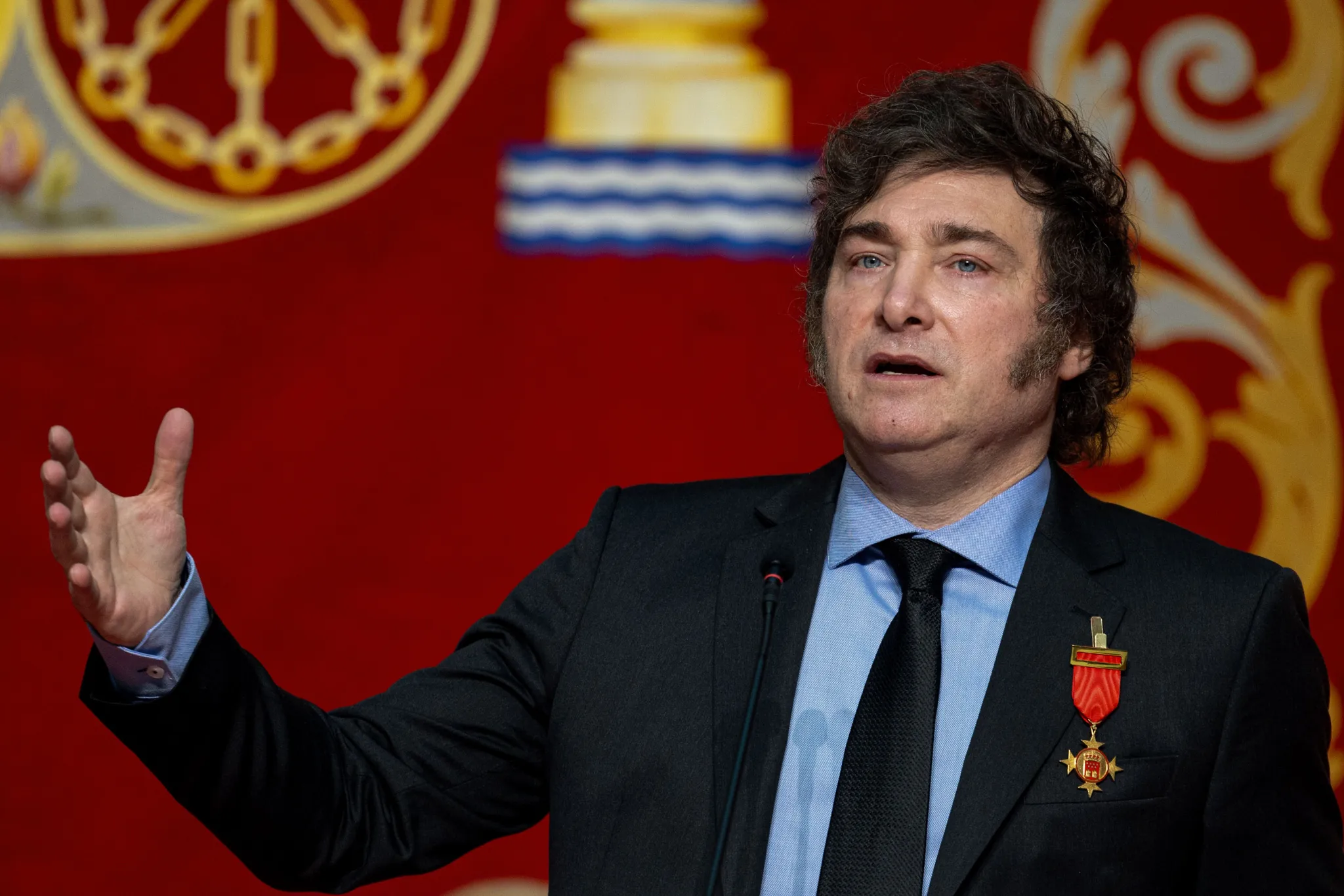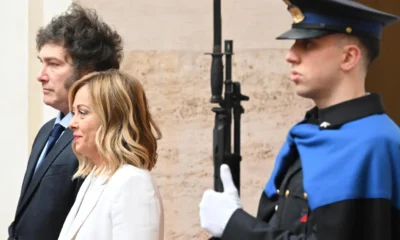International
Investment and technology, keys to the economic relationship between Argentina and Germany

The relationship between Argentina and Germany – a country to which President Javier Milei will make a working visit this weekend – is based on foreign investment, cooperation in natural resources and trade exchange, supported by bilateral agreements and joint projects to promote economic and technological development in both countries.
Milei is scheduled to travel tomorrow, Saturday, to Germany, where he will be awarded in Hamburg (north) the Hayek medal that the homonymous society awarded him due to his achievements as a “reformer”.
The next day, the Argentine president and the German Chancellor, Olaf Scholz, will hold a meeting in Berlin at the head of their respective delegations.
Germany has shown interest in cooperating with Argentina in the exploration and production of critical minerals such as lithium and copper, essential for the energy transition and the manufacture of batteries. This aligns with Germany’s efforts to diversify its sources of supply and reduce dependence on China.
In 2023, the stock of total Foreign Direct Investment (FDI) in Argentina ammounted to 128,855 million dollars (about 120,382.7 million euros), which represents 10.4% more than the previous year and 26.4% of the Gross Domestic Product (GDP), according to data from the Ministry of Foreign Affairs.
The upward trend of FDI continues in 2024, with various sectors such as lithium extraction, hydrocarbons and financial technology attracting a considerable amount of foreign investment.
Germany – an important investor in the automotive, technology and manufacturing industry – is in eighth place in FDI in Argentina, after the United States, Spain, Brazil, the Netherlands, Chile, China and Italy.
In 2023, German companies in Argentina made a significant investment in various sectors.
A survey by the Argentine-German Chamber of Industry and Commerce (AHK) and the consultancy EY Argentina revealed that 74% of German companies planned to invest more than one hundred million dollars (about 93.42 million euros) in the South American country. These investments were mainly used for fixed assets and the incorporation of technology.
Germany’s FDI stock in Argentina is mainly focused on the manufacturing (35%), mineral and oil extraction (22.3%), and retail and wholesale sectors (10.9%).
German companies such as Siemens, Volkswagen and Bayer have a strong presence in Argentina, promoting innovation and technology transfer in various industries.
Projects and cooperation in critical minerals are another key point of the economic relationship between the two countries, since Argentina is one of the main producers of lithium, essential for the manufacture of batteries, and that in 2022 exports of this element increased by 234%.
In February 2024, representatives of Germany and Argentina discussed cooperation in the supply chain of critical minerals, such as copper and lithium, with the aim of reducing dependence on China.
Regarding Argentine investment in Germany, which is less significant, companies from the South American country are beginning to explore opportunities in high-tech and renewable energy sectors.
In terms of cooperation and strategic alliances, both countries have signed bilateral agreements to encourage investment and facilitate trade. Argentina and Germany collaborate in infrastructure and technological development projects, taking advantage of the German experience in these fields.
Trade between Argentina and Germany includes Argentine exports of agricultural and mineral products, and imports of German machinery and industrial products. This exchange is fundamental for the Argentine economy and benefits both countries by diversifying their markets.
In 2022, total trade between Germany and Argentina exceeded $3.6 billion, with a growth of 8% compared to 2021.
In March 2024, Germany exported products worth 169 million euros (181 million dollars) to Argentina and imported goods for 104 million euros, resulting in a positive trade balance of 65.3 million euros (70 million dollars) for Germany.
Exports from Germany to Argentina include machinery, vehicles, chemicals and pharmaceuticals. The European nation is a key supplier of advanced technologies and industrial equipment necessary for various sectors of the Argentine economy.
Meanwhile, imports from Germany from Argentina focus on agricultural products and food, such as soybeans, wine and meat, as well as minerals.
The commercial relationship benefits from the complementarity between the economies, where Argentina provides raw materials and food, and Germany provides technology and manufactured products.
Both countries are working on closing a free trade agreement between the European Union (EU) and Mercosur, which could further enhance trade exchange and open up new business opportunities.
This agreement has been the subject of long negotiations and currently faces significant opposition from several EU member countries, especially France and Austria.
In contrast, countries such as Germany, Spain and Portugal are in favor of moving forward with the agreement, highlighting the economic benefits and the need to strengthen trade relations with Latin America.
Central America
Senator Van Hollen Meets with Deported MS-13 Member in El Salvador; Trump and Bukele React

U.S. Democratic Senator Chris Van Hollen, representing the state of Maryland, held a meeting in El Salvador with deported MS-13 gang member Kilmar Ábrego García, a member of the criminal group classified by the U.S. government as a terrorist organization.
“Kilmar Ábrego García, miraculously resurrected from the ‘extermination camps’ and ‘torture chambers,’ now sipping margaritas with Senator Van Hollen in the tropical paradise of El Salvador!” wrote President Nayib Bukeleon X (formerly Twitter), sharing photos of Van Hollen, Ábrego García, and a lawyer sitting together at a Salvadoran hotel.
The deported gang member is seen wearing a plaid shirt and a flat-brimmed cap, seated at a table with glasses and coffee cups. The senator also shared images of the meeting on his own social media accounts.
Bukele reaffirmed that Ábrego will remain in El Salvador and will not be returned to the United States.
“Now that his health has been confirmed, he has earned the honor of remaining under the custody of El Salvador,” Bukele added.
Former U.S. President Donald Trump criticized the senator’s meeting with Ábrego on Truth Social, calling Van Hollen “a fool” for advocating for Ábrego’s return to the U.S.
International
Pope Francis Appears for Easter Blessing, Calls for Peace and Religious Freedom

Pope Francis, still recovering from pneumonia, appeared on the balcony of St. Peter’s Basilica in the Vatican on Easter Sunday and, with a faint voice, wished a “Happy Easter” to the thousands of faithful gathered to celebrate the Resurrection of Christ.
A month after being discharged from a lengthy hospital stay, the presence of the 88-year-old pontiff had remained uncertain, with the Vatican not confirming his attendance ahead of time.
Eventually, the pope made a brief appearance in a wheelchair shortly after 12:00 p.m. (10:00 GMT) to deliver his traditional “Urbi et Orbi” blessing (“to the city and to the world”).
Although no longer wearing an oxygen cannula, the Argentine Jesuit relied on a close aide to read his Easter message, which touched on major global conflicts.
Francis condemned the “dramatic and unworthy humanitarian crisis” in Gaza and called for a ceasefire, while also expressing concern over the “growing climate of antisemitism spreading across the globe.”
He further emphasized the importance of religious freedom and freedom of thought, stating that without mutual respect, “peace is not possible.”
International
Thousands rally nationwide against Trump’s threat to U.S. democracy

Thousands of protesters gathered on Saturday (April 19, 2025) in major cities like New York and Washington, as well as in small communities across the United States, in a second wave of demonstrations against President Donald Trump. The crowds denounced what they view as growing threats to the country’s democratic ideals.
In New York City, demonstrators of all ages rallied in front of the Public Library near Trump Tower, holding signs accusing the president of undermining democratic institutions and judicial independence.
Many protesters also criticized Trump’s hardline immigration policies, including mass deportations and raids targeting undocumented migrants.
“Democracy is in grave danger,” said Kathy Valyi, 73, the daughter of Holocaust survivors. She told AFP that the stories her parents shared about Adolf Hitler’s rise to power in 1930s Germany “are happening here now.”
In Washington, demonstrators voiced concern over what they see as Trump’s disregard for long-standing constitutional norms, such as the right to due process.
-

 International4 days ago
International4 days agoArsenal stun Real Madrid at the Bernabéu to reach Champions League semifinals
-

 Central America3 days ago
Central America3 days agoNicaraguan Exiles to Mark 7th Anniversary of 2018 Protests with Global Commemorations
-

 International3 days ago
International3 days agoDominican ‘False Hero’ Arrested for Faking Role in Nightclub Collapse That Killed 231
-

 International4 days ago
International4 days agoBogotá residents line up for yellow fever vaccine amid national alert
-

 International2 days ago
International2 days agoACLU seeks emergency court order to stop venezuelan deportations under Wartime Law
-

 International4 days ago
International4 days agoDeSantis’ immigration crackdown sparks alarm in Venezuelan Communities in Doral
-

 Central America2 days ago
Central America2 days agoUN complaint filed against Costa Rica over detention of migrant children
-

 International4 days ago
International4 days agoMexico refuses to restore ties with Ecuador while Noboa remains in office
-

 International20 hours ago
International20 hours agoThousands rally nationwide against Trump’s threat to U.S. democracy
-

 Central America2 hours ago
Central America2 hours agoSenator Van Hollen Meets with Deported MS-13 Member in El Salvador; Trump and Bukele React
-

 International2 hours ago
International2 hours agoPope Francis Appears for Easter Blessing, Calls for Peace and Religious Freedom





























